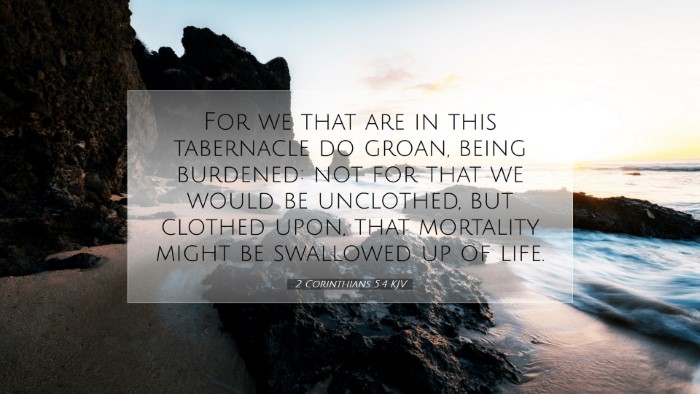Commentary on 2 Corinthians 5:4
Verse Text: "For we that are in this tabernacle do groan, being burdened: not for that we would be unclothed, but clothed upon, that mortality might be swallowed up of life."
Introduction
This verse from 2 Corinthians 5:4 touches upon profound theological concepts regarding mortality, eternal life, and the nature of our physical existence as believers in Christ. The Apostle Paul employs metaphorical language, likening our earthly bodies to a temporary dwelling or “tabernacle,” which sets the foundation for a deeper understanding of the hope of resurrection and eternal life.
Contextual Background
Paul's epistle to the Corinthians reflects his deep concern for the church in Corinth, addressing various issues including suffering, spiritual growth, and the hope of resurrection. The overarching theme of this chapter emphasizes the contrast between the earthly body and the heavenly dwelling, culminating in the promise of eternal life offered through Christ. This verse specifically focuses on the human experience of longing for liberation from our physical limitations.
The Meaning of "Tabernacle"
Matthew Henry writes, "The tabernacle is here taken to be the body, which is but a transient dwelling place for the soul." In this context, our physical bodies are likened to a tent, emphasizing their temporary and fragile nature. Paul contrasts this with the eternal dwelling that awaits believers, highlighting the assurance of a perfected existence beyond physical death.
Groaning and Burden
In expressing that “we do groan, being burdened,” Paul acknowledges the reality of human suffering and the existential weight that accompanies life in a fallen world. Albert Barnes states, "The groaning is the natural expression of the soul that feels the burdens of sin and suffering." This groaning arises not merely from a desire for escape, but rather from the hope for something better, a transformation and fulfillment that God promises.
Not Unclothed, but Clothed Upon
Paul's mention of not desiring to be "unclothed" reveals a theological point: the fear of death is not simply a fear of non-existence but a longing for completeness. Adam Clarke comments that "All the saints have a desire to be relieved from their present suffering, not because they wish to cease to exist, but that they may be clothed with immortality." Thus, the anticipation for resurrection and eternal life shapes the believer’s perspective on earthly trials.
Swallowed Up of Life
The phrase "that mortality might be swallowed up of life" is a powerful testament to the Christian hope. Barnes elaborates that this suggests that death is not the end but rather a transition into a greater existence. "Life is the ultimate triumph over mortality, signifying the full realization of God’s promises." This speaks profoundly to pastors and theologians about the transformative nature of faith in Christ, where earthly suffering will give way to everlasting joy.
Theological Implications
Theologically, this verse affirms key Christian doctrines regarding death, resurrection, and eternal life. It encourages believers to reflect on their mortality while holding onto the promise of life through Christ. Here are some implications:
- Hope in Suffering: The acknowledgment of our burdens should not lead to despair but cultivate a deeper reliance on God’s promises.
- Identity in Christ: Understanding our earthly existence as temporary shapes our identities, motivating us to live with purpose and expectancy.
- The Nature of Resurrection: This verse serves as a foundational text articulating the transformation that believers will experience, affirming that God’s plan transcends death.
Conclusion
2 Corinthians 5:4 encapsulates profound truths about the believer’s condition in relation to time, suffering, and ultimate redemption. It calls the church to embrace the “groans” of the present while eagerly anticipating the “clothing” of life to come. As Paul reassures us, there is no reason for fear, for in Christ, our mortality is indeed swallowed up by the everlasting life that awaits. This reminder is vital for spiritual leaders and scholars as they encourage their congregations and students to hold onto this hope amid life’s trials.


